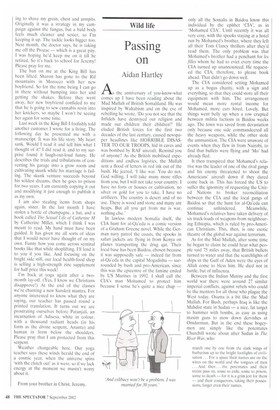Passing on
Aidan Hartley
Athe anniversary of you-know-what comes up I have been reading about the Mad Mullah of British Somaliland. He was inspired by Wahabism and on the eve of rebelling he wrote. 'Do you not see that the Infidels have destroyed our religion and made our children their children?' He eluded British forces for the first two decades of the last century, caused newspaper headlines like HORRIBLE DISASTER TO OUR TROOPS, hid in caves and was bombed by RAF aircraft. Remind you of anyone? As the British mobilised expeditions and endless logistics. the Mullah sent a flood of letters in red ink out of the bush. He jeered, 'I like war. You do not. God willing, I will take many more rifles from you, but I will not take your country. I have no forts or houses or cultivation, no silver or gold for you to take. I have no artificers. The country is desert and of no use. There is wood and stone and many ant heaps. But all you get from me is war, nothing else.'
In lawless modern Somalia itself, the CIA hunt for al-Qa'eda is a comic version of a Graham Greene novel. While the German navy patrol the coasts, the spooks in safari jackets are flying in from Kenya on planes transporting the drug qat. Their local base has been Baidoa, chosen because it was supposedly safe — indeed far from al-Qa'eda in the capital Mogadishu — surrounded by bush and pro-American, since this was the epicentre of the famine ended by US Marines in 1992. I shall call the CIA's man Mohamed to protect him because I sense he's quite a nice chap — only all the Somalis in Baidoa know this individual by the epithet 'CIA', as in 'Mohamed CIA'. Until recently it was all very cosy, with the spooks staying at a hotel run by Mohamed's brother, where they left all their Tom Clancy thrillers after they'd read them. The only problem was that Mohamed's brother had a penchant for les filles whom he had to evict every time the CIA turned up unannounced. He requested the CIA, therefore, to please book ahead. That didn't go down well.
The CIA considered setting Mohamed up as a bogus charity, with a sign and everything, so that they could store all their equipment with him. The arrangement would mean more rental income for Mohamed. more cars hired. Lovely. But things went belly up when a row erupted between militia factions in Baidoa weeks ago. The town was saved from devastation only because one side commandeered all the heavy weapons, while the other stole the ammunition. The CIA were unaware of events when they flew in from Nairobi, to find that bullets were flying and `Mo' had already fled.
It then transpired that Mohamed's relative was the leader of one of the rival gangs and his enemy threatened to shoot the Americans' aircraft down if they dared come back in. This has forced the US to suffer the ignominy of requesting the United Nations to broker reconciliation between the CIA and the local gangs of Baidoa so that the hunt for al-Qa'eda can continue unhindered. Meanwhile, Mohamed's relatives have taken delivery of six truck-loads of weapons from neighbouring Ethiopia, which is ruled by pro-American Christians. This, then, is one exotic theatre of the global war against terrorism.
As for the Mad Mullah, after some time he began to claim he could hear what people said 75 miles away, that British bullets turned to water and that the searchlights of ships in the Gulf of Aden were the eyes of Allah come to bless him. He died not in battle, but of influenza.
Between the Indian Mutiny and the first world war there were around 27 similar imperial conflicts, against rebels who could be the mentors for all those who plague the West today. Osama is a bit like the Mad Mullah. For Bush, perhaps Iraq is like the Mandist state in Sudan — a nice, fat target to hammer with bombs, as easy as using maxim guns to mow down dervishes at Omdurman. But in the end these bogeymen are simply like the potentates Churchill wrote about after Sudan in The River War, who
march one by one from the dark wings of barbarism up to the bright footlights of civilisation ... For a space their names are on the wires on the world and the tongues of men ... And then ... the potentates and their trains pass on, some to exile, some to prison, some to death — for it is a grim jest for them — and their conquerors, taking their possessions, forget even their names.


























































 Previous page
Previous page